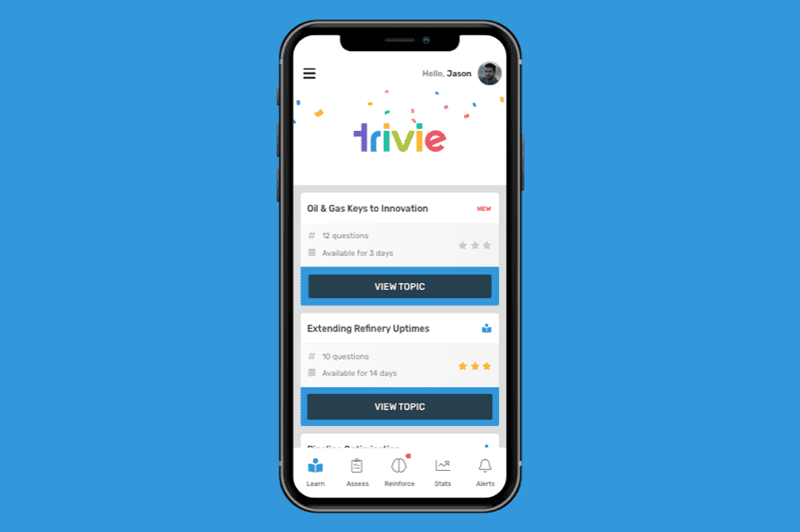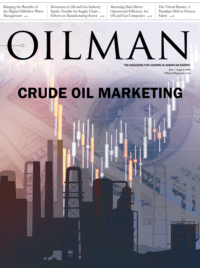Artificial Intelligence (AI) was taking the world by storm long before the COVID-19 crisis and the oil and gas crash of 2020 were on our radar. The technology has incredible range of applications and operates across many industries to improve operations. But as individuals have been forced to social distance and person to person operations have changed, the importance and application of AI are more important than ever.
Economic Realities
Oil and gas companies have always spent considerable money training their employees. With commodity prices here to stay and demand that is uncertain, combined with the need to reskill employees, oil and gas companies, in particular, need to reassess how they train, and how they can achieve better performance from their employees.
In an ever-increasing digital world, oil and gas companies need to upskill their employees in a way that is scalable, effective, measurable, reportable, and ultimately fiscally responsible. With digital transformation training, companies train their teams to better understand what various technologies are, like artificial intelligence (AI) and Internet of Things (IOT), and how employees can apply the technologies within their jobs. It’s critical that personnel are capable of applying this new knowledge on the job across functional roles.
It’s crucial, especially during this crisis, that companies deliver and measure efficacy of training, ensuring that their people learn and retain the information. What’s more, not every job family, not to mention every individual, will have the same comprehension on the same topics as its peers.
Studies conducted by psychologist Hermann Ebbinghaus and others show that without adequate reinforcement, employees forget up to 80 percent of what they learn after only 30 days. Memory slippage translates into failure and wasted training dollars. That alarming data means that even seasoned employees will have fall off when not engaged. It’s imperative from a safety and compliance standpoint that important information is being read, consumed, digested, and retained. Further, it’s potentially game-changing from an economic standpoint.
Each time a training event occurs, companies should be asking a multitude of questions: Will the trainees actually remember the training? Will they get it? Will it lead to better performance? C-level executives and corporate communications persons often have similar thoughts enter their minds when they send out communications to their employees: Did they read it or listen to it? Did they get what we need them to get? Will they remember it?
As a founder of Trivie, a training and communication AI app company focused on making corporate training and communication more effective, my team and I have taken that all into account. Through adaptive learning, Trivie analyzes a user’s proficiency over time on various topics and keywords, and recommends personalized quizzes based on what the user is predicted to have forgotten, right at the moment they are predicted to have forgotten it. This personalization, at the moment of need, leads to increased knowledge retention, better concept mastery, and a stop-loss for wasted training dollars. Our adaptive learning and personalization help company leadership determine who needs to receive what information based on knowledge base and job role, to scale. The savvier employees are digitally, the more productive and agile the company can become as a whole.
Effects of the Pandemic
In addition to the economic realities of the industry, the pandemic has led to a sudden increase in remote work and pushed employee anxiety levels to historical highs. Companies need a way, now more than ever, to take the cultural and social pulse of their organization. With Trivie, companies are able to take that pulse through surveys and discussion boards. Surveys allow for pointed questions around everything from feedback to mental health checks. While Discussion Boards have been incredibly successful in fostering organic and digitized water cooler conversations around best practices, crowdsourced learning has shown to be very successful for encouraging best practices as another social outlet. With most feedback engines, a company will only hear from “the squeaky wheels.” With Discussion Boards, a company will get a broader, more comprehensive picture of their employees’ voices.
One of the major players in oil and gas is currently using our technology to help determine enterprise resource planning (ERP) implementation preparedness (what training do my people need as we change the business processes?) and, ultimately, to ensure the success of the implementation. They are also using our AI technology in a more traditional way, to ensure that employees remember safety procedures and protocols at their refineries.
When the pandemic hit, we had companies understand the need for team communication beyond training, and we adjusted to serve that need. Companies used our technology for things like work-from-home training and best practices and other generic communications about COVID-19. As companies are looking to begin bringing their employees back to the office, we see clients using the platform to ensure that employees are on the same page regarding what they need to know and do.
Today’s World
Today’s fast paced work environment gives employees little time to engage with new systems. However, some of our in-house studies have shown that employees typically need less than ten minutes a month to achieve a material increase in knowledge. When our application is used just a few times a month, an employee’s retention score is elevated to over 90 percent.
In the world we exist in now, proper communication and training have become more important, more critical. How do you know if your employees are “getting it” when you do Zoom meetings all day? How do you know your employees are “getting” the corporate communications that are going to them? How do you maintain your company culture when everyone is remote?
Companies are utilizing AI technology like Trivie to help answer these questions, and to get to know their employees better, in a fiscally responsible way.
Headline image courtesy of Trivie
Leland has been in the software and services industry for over 35 years. He currently advises or is on the Board of Centro Media (digital media), Solarsense (alternative energy development), Realnex (real estate software), Spruce (apartment digital services), Patchr (circuit board design), Tachyus (oil&gas software) and Trivie (training reinforcement) where he is a co-founder & Executive Chairman. He helps these companies with strategy, marketing, sales and general mentoring. Previously, Leland was CEO of Acorn Performance Group and oversaw its daily operations. He brings extensive experience in managing large organizations that deliver software solutions and consulting services to corporate customers. Prior to Acorn, Leland was at BMC Software, where he served as an Executive Officer and Chief Marketing Officer. Prior to BMC, Leland worked for Oracle in various senior management positions, including Vice President of Product Marketing and Regional VP of Sales. He received a B.A. with Honors in Economics from Princeton University.







